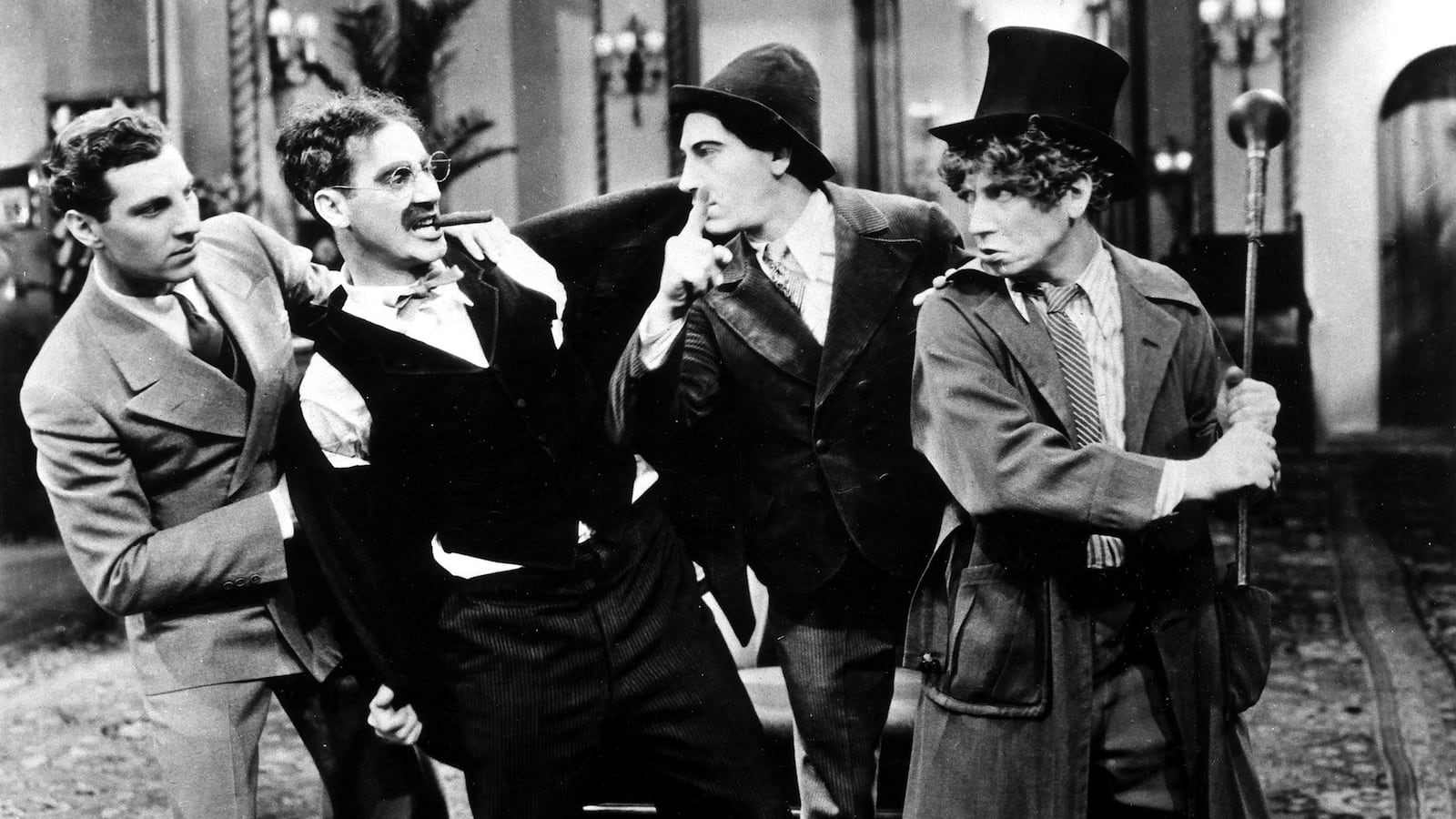Lately I’ve been noticing it’s just about impossible to go to the movies and not witness people talking to each other throughout, or turning on their phone to scan what’s transpired since five minutes ago in their Facebook world.
Doesn’t matter the picture. A couple of 27-year-old women are just as likely to chat through 1956’s Forbidden Planet, as I recently witnessed, as a gaggle of teenagers are wont to do the phone thing during Rogue One.
This tends to happen more during the bits where the people onscreen are talking, rather than fleeing from peril or blowing up a baddie.
Which got me thinking about the Marx Brothers, as I’ve been doing a lot lately, given the beautiful new package of their first five films which recently came out on Blu-ray, and the zeal many theaters have in putting on a Marx Brothers marathon at the start of each new year.
The Marx Brothers were the first comedians of cinema who could not have existed in the silent age. Their humor was in large part word-based. Some of the original comedic clowns like Buster Keaton and Charlie Chaplin existed in both the silent and talkie eras, with far less success in the latter. Oliver and Hardy were the only duo who excelled in each. But the Marx Brothers, no: dudes needed to talk, and talk a lot. Save, of course, for Harpo, who tended to squeak, usually with a horn he had laid his mitts on.
Cinema buffs have long wanted the Marx Brothers on Blu-ray. As far as Hollywood history goes, they were one of the last big holdouts.
The circulating prints looked like ass, with lots of hiss and pops, a layer of wooly scratches all over the images—like relics someone had dug up in some memory box planted in the earth.
But as much as I wanted to see the promised glory of the restorations, I couldn’t help asking myself if the Marx Brothers and their humor even worked in today’s world, to today’s audiences—whether we’re talking about people in their seventies or people in their twenties.
So far as cleaning up battered old materials goes, Universal’s handling of those first five Marx Brothers films—The Cocoanuts (1929), Animals Crackers (1930), Monkey Business (1931), Horse Feathers (1932), Duck Soup (1933)—will just about part your jaw from your mouth.
The films look like they could have been made in the last decade, with someone simply electing to shoot them in black and white.
Harpo moves like even more of a dervish, Groucho stamps forward to hit his mark and deliver his latest piece of wiseassery with greater celerity, Chico’s eyes convey details and sly asides you didn’t know they did previously, and as for Zeppo—well, no one cares much about the stick-up-his-ass straight man, do they? Tough gig for poor Zeppo.
The plots are, to be generous, threadbare. The Marx Brothers had come out of vaudeville, where every good performer knew that everything was just a framing device to get to the gag. If you want to pull an Ambrose Bierce you might say that life is a version of this, and it’s always struck me how much the seemingly light zaniness—which ups and ups and ups—of the Marx Brothers has in common with a Beckett play, but with more yucks.
They take everything further—every gag, every repartee routine—than you’d think possible, arriving at what surely must be the point of no return, then doubling back faster than they came.
The Cocoanuts introduces us to their particular gist. Groucho runs a hotel in Florida, money is tight, the hotel staff likes to break into song and dance, Harpo and Chico show up, as they always do, regular Marx Brothers grand dame Margaret Dumont is present, there’s a con. Harpo—a walking deus ex machina in slightly humanish imp form—doesn’t speak, but he mouths a few words when he’s offended, a symbol of internalized frustration.
When you watch him, it’s easy to remark, “Yeah, I hear ya, man, bloody people, right? Annoying.” Then you realize you’re someone talking to yourself in response to a guy who doesn’t talk in a film from eighty-plus years ago, which is sort of the point, and sort of why the Marx Brothers still work.

Their energy is created through human-to-human action, which often takes the form of madness and frustration, and then giving expression to that frustration.
Something, in other words, we all wish to do throughout our days. Groucho in particular, who bears no insult, real or imagined, with silence, would pitch a fit everyday when he turned up at the Starbucks line in the morning to get his pre-work coffee and someone started in on their inanities. You’d like to. I’d like to. Hell, I’m going to try it out after this and relieve some internal tension. Only kidding. But I like knowing that the Marx Brothers do it for me, after a fashion, and there’s a nice voyeurism in watching them and wishing you could get in on the act.
The films after The Cocoanuts, as the blueprint-setter, became a little less rough-hewn, but no one is here for plot or fancy dissolves or dolly shots. You want freneticism, and so far as that energy goes, just atoms pinging and ponging against each other at madcap rates, we have what’s basically the verbal version of an action film.
Monkey Business has the brothers as stowaways on an ocean liner, and was fashioned almost entirely from two old vaudeville acts they used to do and an idea Groucho nicked from a friend. Horse Feathers is an out-of-its-gourd football film, one of the best that sport has produced, in which athlete culture tussles it out with academia. Groucho is a college president, Chico a bootlegger, and the climatic scene features parts lifted from Ben-Hur and Harpo scoring a winning touchdown in a chariot.
It’s an iconic bit, as much so as that fellow riding the bomb out of the plane in Kubrick’s Dr. Strangelove. Animals Crackers is perhaps a rung up, the film in which the Marx Brothers seem to collectively think, “Hey, no one is ever stopping us, how far can we go?”
Groucho is a one-man madhouse of an African explorer, who uncorks lines like: “One morning I shot an elephant in my pajamas. How he got in my pajamas, I don’t know.”
Is it funny? Well, no, not in and of itself. But what it is is that he never stops. The idea of someone like this is funny, just like Cliff Clavin on Cheers is funny, that local character you know at your whatever it is—hair salon, yoga studio, coffee shop, department meeting—is funny.

You don’t want to say this is conceptually funny, because that sounds like funny in theory, and not very funny after all. But it’s when Harpo and Chico enter, Groucho keeps doing his thing, they start up on theirs, that a humor emerges that knows no constraints like decade or era.
And the best example of that, Marx Brothers-wise, is Duck Soup. Comedy films get next to no love in terms of those “Best Ever” movies lists. Nor do horror films. But you could put Duck Soup in the pantheon with The Rules of the Game, Citizen Kane, Vertigo, Bride of Frankenstein, The General, and The Searchers.
Critics at the time thought it was a letdown and that the brothers had lost their way. Groucho is the president of Freedonia. As usual, he’s broke; or, rather, his country is. Chico and Harpo are international spies. A scheme is put in place to get some much-needed funds, but this goes awry because Groucho thinks he’s been insulted—thus necessitating war, Groucho-style.
Present-day political commentators should probably be seizing on a film like this and making learned references to it, but a lot of people just don’t know the damn thing, won’t seek out the damn thing, and are going to miss out on one damned awesome thing in their lives.
But if you’re not one of those people, or you’re already in the know, then yes, the proverbial ass may still be laughed off when watching the Marx Brothers. And the more frustration you have going on on a given day, the more you’ll probably laugh. And who, in any era, doesn’t have spare amounts of that?




